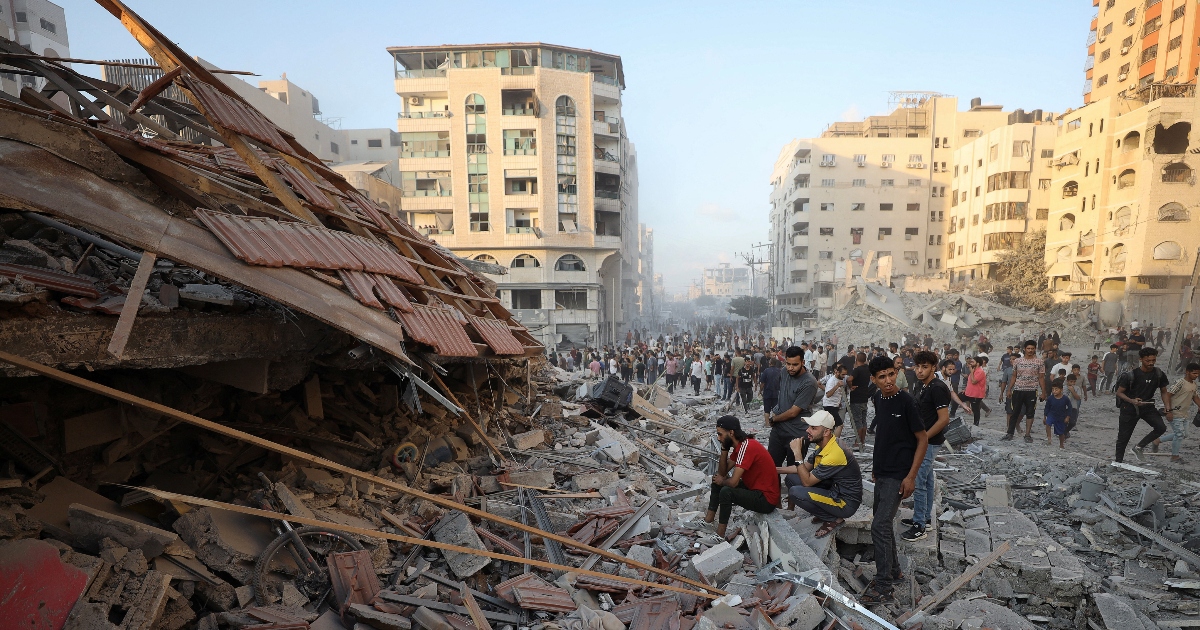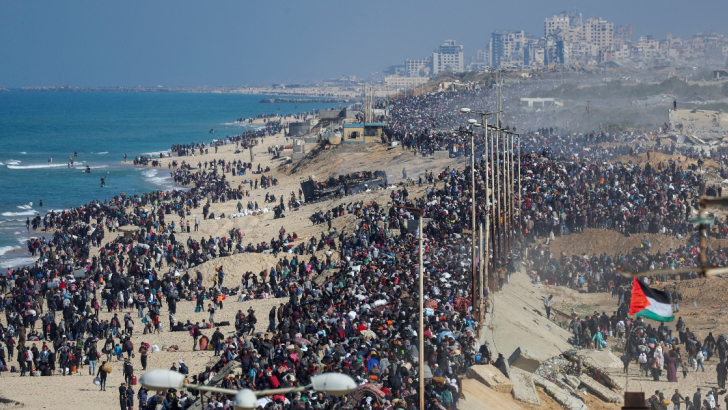Update. Italian scientific institutions against the genocide in Gaza

A residential building destroyed by an Israeli air strike in Gaza City, 7 September 2025. REUTERS/Khamis Al-Rifi
6 October 2025
In recent weeks, the attention of civil society has increasingly focused on the situation in Palestine and its developments. The illegal blockade of the Global Sumud Flotilla marked a turning point in public demonstrations against a genocide that is going on in real time. In Italy, in particular, but also in other countries, citizens have taken to the streets to show their willingness to defend fundamental human rights, urging governments to take strong action to protect the rights of Palestinian civilians.
This civil uprising is also evident within the national and international scientific community. Since we published our mapping initiative listing the official measures taken by Italian universities, research centres, and scientific societies to distance themselves from the Israeli government and institutions supporting its criminal initiatives (see below), we have received numerous reports from readers, and our table has steadily grown.
One of the most recent reports we have received is from the "Academic Boycott Database" collective, which has launched a similar international mapping initiative to document universities that have severed ties and collaborations with Israeli institutions in support of the Palestinian cause. We present here a map from the Academic Boycott Database summarising these initiatives.
The scientific community worldwide is on the move. Il Bo Live will continue to map such movements. Over the next few weeks, we will be launching a new mapping initiative focusing on scientific institutions (universities, scientific societies, research centres) across Europe that have taken a clear stance on this issue, cutting relations with Israeli institutions and launching projects in support of the Palestinian scientific community.
If you know of any such nitiatives that you think are relevant for this broader mapping initiative, please let us know by contacting ilbolive@unipd.it.
18 September 2025
Initiatives by the Italian scientific community against the genocide in Gaza are increasing: in recent days, we have been informed of other initiatives, which we have added to the table below. We thank our readers and, with your help, we hope to make this effort of investigation and mapping ever more complete.
7 September 2025
In the face of the relentless massacre of civilians in the Gaza Strip, recent months have seen a surge worldwide in mobilisations and public statements from civil society (the most significant being the departure of the Global Sumud Flotilla), humanitarian organisations, some States, the cultural sector, and the international scientific community.
The latter, in particular, has worked to promote peace and protect civilians since the start of the invasion of Gaza, with many international collaboration initiatives launched over these roughly 24 months of conflict. Among the most recent is the campaign “STOP THE SILENCE!” – promoted, among others, by Roberto de Vogli, professor of psychology at the University of Padova – which has been endorsed by numerous scientific societies active in the field of public health.
Against this international momentum in the academic community, after more than a year of widespread hesitation (though with notable exceptions), the Italian academic and scientific community has also begun to raise its voice, condemning what is happening in Palestine and expressing solidarity with the people targeted by the Israeli invasion.
Over the past year, some Italian universities, research centres, and scientific societies have taken official measures to distance themselves from the government of Israel and from institutions that, directly or indirectly, support its criminal initiatives (which can be defined as such in light of their clear violation of international law). We attempted to map these initiatives, and the resulting list shows that as of today, despite some movement within the academic world, the number of universities, public research entities, and scientific and academic societies that have not only openly condemned the ongoing genocide in Gaza but also taken concrete measures (for example, suspending collaborations with Israeli companies and research institutions tied to the Israeli government’s activities) remains, to our knowledge, surprisingly small.
Specifically:
- Of the 61 public universities in Italy, eleven have announced measures such as the suspending agreements with Israeli research entities, universities, or companies, and refusing to join the Industrial, Scientific and Technological Cooperation Agreement between Italy and Israel promoted by the Italian Ministry of Foreign Affairs (MAECI). Several other universities – such as the University of Bologna and Roma Tre University – along with individual departments that have taken their own initiatives, have issued condemnations of the crimes committed in Gaza and called for a diplomatic resolution of the conflict;
- Of the 13 Italian public research institutions, in four (CNR, INGV, INAF, CREA), part of the workforce has mobilised, asking the presidents and boards of directors to adopt measures comparable to those taken by some universities, so far without any response from the administrations;
- Eight Italian scientific institutions have issued statements condemning Israel’s violations of international law and, in some cases, calling for the suspension of collaborations with complicit research institutions.
We are working to map initiatives similar to those described in this article. Unfortunately, in many cases, statements, letters, and appeals are difficult to find online. If you are aware of initiatives we have not reported, or if your university or research institution has taken concrete measures but is not included in our table, please let us know by contacting ilbolive@unipd.it.
An open letter from INGV researchers
One of the most recent initiatives was promoted by several employees of the National Institute of Geophysics and Volcanology (INGV), one of Italy’s thirteen public research institutions. In July 2025, a discussion began within INGV on the position and role that a public research centre should take with regard to wars, and in particular the events unfolding in the Gaza Strip.
The discussion culminated in the drafting of an open letter addressed to the President, the Board of Directors, and the Scientific Council of the Institute. The letter was made public at the end of July 2025 and gathered signatures of 398 from among the approximately 1,200 employees and research staff at the Institute.
Stefano Corradini, physicist and researchers at the INGV, explained to Il Bo Live the demands contained in the letter:
“This is not the first time that we have written an open letter to our administration since the beginning of the invasion of the Gaza Strip.” In fact, the first letter dates back to April 2024 and, unlike the most recent one, was promoted only by employees belonging to the Knowledge Workers Federation (FLC) of the CGIL trade union.
“In this second letter, we first reiterate the request for the administration to condemn the crimes committed by the Israeli government and army in the Gaza Strip – crimes that have been recognised in several resolutions of the UN Security Council and General Assembly. Moreover, this time we put forward more specific requests: that existing agreements with Israeli universities be suspended and that the Institute refrain from participating in the MAECI call for research collaborations between Italy and Israel. We also asked for the establishment of funds to support Palestinian students, to promote study, research and specialisation mobility programmes. Finally, we stressed the need to establish an ethics committee.”
While the other demands are consistent with measures taken over the past year by some universities, the latter point – the establishment of an ethics committee to evaluate the Institute’s external collaborations – is, to our eyes, particularly significant.
As Corradini clarified in response to one of our questions, INGV researchers, like employees from other public research entities, lack precise information on which and how many collaborations exist with universities and industries working not only on civilian but also on dual-use technologies, nor on which projects fall into this category.
“The idea behind the ethics committee,” Corradini explained, “ is first and foremost to carry out a census of all these partnerships, because in light of what is happening, we believe it is necessary to have a clear picture.”
No response from the INGV administration
Last year, the Board of Directors publicly responded to the employees’ open letter with a press release. “In that document,” the researcher summarised, “the INGV administration called for an immediate ceasefire and the resumption of negotiations towards a peaceful solution based on international law and UN resolutions, but at the same time stated that opinions and choices on such matters should remain solely within the individual sphere. In addition, the Board declared it would not boycott ongoing collaborations, judging it a priority to maintain ties with the academic community, including the Israeli one.”
Since then, the Institute’s official position does not appear to have changed. In response to the latest letter, the administration has not issued an official statement but instead sent an internal email, reaffirming the validity of what was stated in the spring 2024 press release, particularly regarding the responsibility for taking a position, which, according to the administration, lies not with INGV but with individual employees in their capacity as citizens.
Greater transparency required on public research collaborations
One the most pressing issue raised by the researchers – collaboration with institutions directly or indirectly linked to the actions of the Israeli government, and the question of transparency over the Institute’s activities – the administration has yet to take a position.
INGV focuses on geophysics, volcanology, and environmental studies, but some research projects may involve dual-use technologies, and on this point, opening a debate on the appropriateness of their use is necessary.
“Moreover,” the INGV researcher continued, “the constant need to secure funding for research may lead to considering participation in calls issued by military organisations. Such funding, which usually guarantees civilian aims for research, can have direct impacts in other fields. The issue is truly complex, but the first step is to have a clear picture of the current situation. The data are public: what is needed is transparency. What we ask for is maximum transparency throughout the entire ‘supply chain’ of research – from collaborations on research projects to the companies from which we purchase our research instruments. Some companies are more, other less, involved in military policies: in many cases, we have the opportunity to choose. And so perhaps it is right for a public administration to equip itself with the tools to decide whether one purchase is preferable to another.”
Political influences on research?
The lack of responsiveness from administrations is not limited to INGV but is common to other public research entities where employees have started similar internal debates. At the National Research Council (CNR), for example, researchers issued no fewer than four documents to the Presidency and the Board of Directors, none of which received a formal response.
The governing bodies of these public institutions are politically appointed(pdf) – a practice whose limits became blatantly evident at CNR just a few months ago, with the scandalous delay of over three months in appointing the new President and the Board of Directors, a situation that blocked approval of the budget and the allocation of available funds.
This raises the question of whether such political influence over the leadership of public research entities (their presidents and Boards of Directors are appointed directly by the Ministry of University and Resarch, MUR) may have something to do with their reluctance to take a clear stance on the catastrophic situation in Gaza, in line with the Italian government’s cautious approach.
Coordination among public research institutions
But the silence of the Institutes’ leadership has not stopped the researchers. On 4 September 2025, several employees of INGV, CNR, and INAF (the National Institute of Astrophysics) met for a preliminary meeting. The aim, Corradini explained, is to map the initiatives already in place and to involve other public research institutions in this mobilisation.
“We want to create a coordination group among public research entities. The first goal is to get an overview of existing initiatives, and then to try to reach critical mass, so that our action becomes more effective – even in relation to the demands that we have already made to our institutions.”









